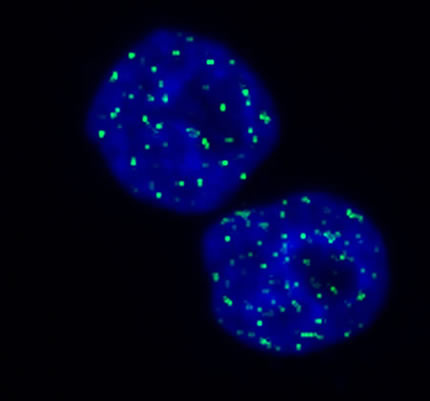 |
|
Genes, Environment & Human Carcinogenesis Jack A. Taylor, M.D., Ph.D.
Principal Investigator Tel (919) 541-4631 Fax (919) 541-2511 taylor@niehs.nih.gov P.O. Box 12233 Mail Drop A3-05 Research Triangle Park, North Carolina 27709 Delivery Instructions Research SummaryThe Molecular & Genetic Epidemiology Group is focused on understanding the interaction between genes and environmental exposures in human carcinogenesis. The group studies human genetic variation in susceptibility to DNA damage and the frequency and pattern of DNA mutation from environmental exposure (Figure 1). In addition the group integrates field epidemiology in its work by applying what it learns to population-based studies of cancer risk. 
Figure 1. H2AX foci following gamma irradiation for measurement of DNA double strand break repair.
These measures are being applied in samples from epidemiologic case-control and case-case studies of a variety of cancers including carcinoma of the bladder, lung, prostate and pancreas; and a variety of environmental exposures including radiation, arylamines, asbestos, nickel, chromate and smoking. One current clinical-translational study follows patients at high risk of developing lung cancer with sequential bronchoscopies and biopsies of preneoplastic lesions. Tissues from these lesions are microdissected using laser capture microdissection and analyzed for LOH and other molecular abnormalities. The group utilizes an interdisciplinary approach with postdoctoral fellows in both epidemiology and molecular biology working together. It offers opportunities for cross-disciplinary training, providing epidemiologists with bench training and molecular biologists with field study and data analysis experience, and opportunities in the expanding field of molecular epidemiology. Major areas of research:
Current projects:
Jack A. Taylor, M.D., Ph.D., leads the Molecular & Genetic Epidemiology Group within the Laboratory of Molecular Carcinogenesis. He earned his M.D. in 1984 from the University of Wisconsin, Madison. He completed his internship at Michigan State and residency in Preventive Medicine at the University of North Carolina. He obtained his Ph.D. in 1993 at the University of North Carolina. He has published more than 75 peer-reviewed articles in leading biomedical journals as well as several book chapters. He joined NIEHS in 1985 and holds adjunct appointments at both the University of North Carolina and Duke University. |
|

